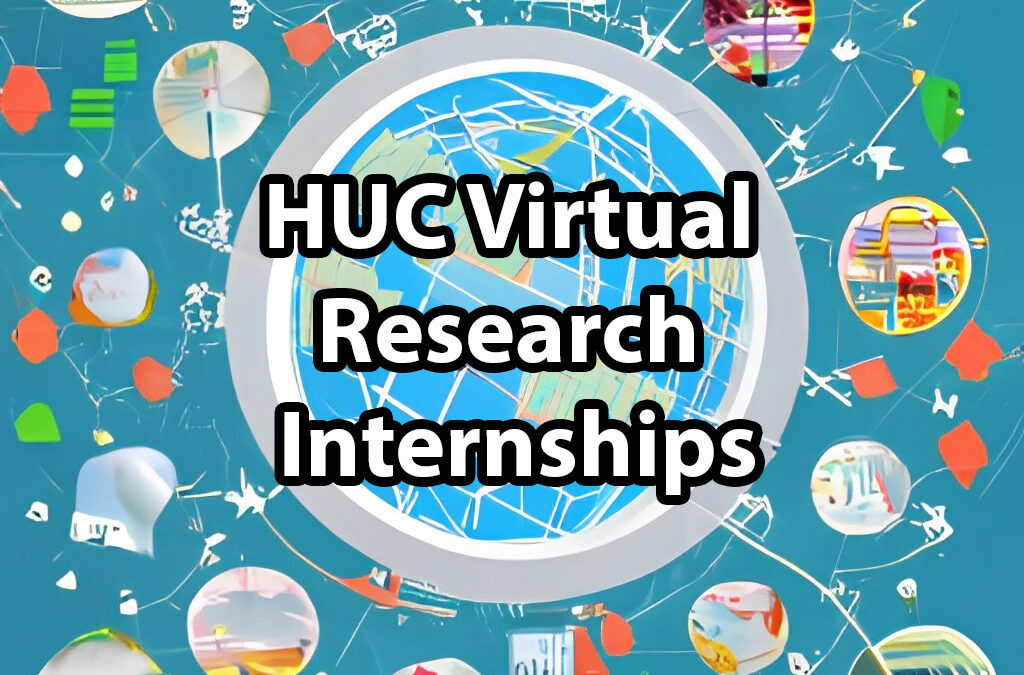Author: Francisco Javier Cartagena Teran, Communications intern at Hemispheric University Consortium, image created with MID Journey by Gabriela Geron, Ph.D.
The Virtual Research Internships program was born in 2021, with the objective of facilitating scientific collaboration and international academic experiences among professors, researchers and students from HUC universities throughout the American continent. It is an adaptation of the research internship program of the Universidad de los Andes, which began 5 years ago in a face-to-face format, and was made virtual because of the pandemic. In its two previous versions, the initiative has been increasingly successful.
The Virtual Research Internships program is developed in the following stages:
- Invitation to teachers to present their projects (March 15 to April 13). Information on how to participate is available here
- Invitation to students to apply for the various vacancies (May 02 to June 07).
- Selection of students by each university and professor (June 07 to July 07)
- Student Registration (July 7 to July 31)
- Start of internships (August 2023)
In this opportunity, Nina Jean-Louis, researcher of the Department of Architecture, Civil Engineering and Environmental Engineering at the University of Miami, and Dr. Felipe Yon, research associate at the Evolutionary Ecology Laboratory of the Faculty of Sciences and Philosophy at the Universidad Peruana Cayetano Heredia, gave us an interview in which we talked about their motivations to participate in the Virtual Research Internships program of HUC 2022. We also talked about how they lived their experience, the contributions, anecdotes and advice they give to other professors to participate in this collaborative research initiative.
Nina Jean-Louis tells us the following about her experience:
“I felt that student Abigail Charles and I mentored each other, not just me mentoring the student, which allows you to be very resilient and check your ego, it was an eye-opening experience, a beautiful collaborative experience.”
Nina decided to participate in the 2022 call for proposals, as it allowed her to work together with another researcher to nurture her project on “How can we better protect cultural heritage in the face of climate change? In that sense this experience made him understand how in other places outside the United States heritage was being protected, what were the differences and similarities of the protection plans, especially in the Caribbean. The collaboration with the student Abigail Charles, from The University of The West Indies provided her with an external and complementary point of view on her research topic.
This opportunity allowed Nina to broaden her access to other researchers from other parts of the world, working in a less isolated environment thanks to the possibilities of virtual meetings. Through this modality she was able to break the pattern of isolated research in one country, city or even just in one location. In this sense, the Virtual Research Internships gave her the opportunity to talk with students and researchers about their research, perceptions, analysis, thoughts and ideas, thus enriching her research with completely different perspectives.
Nina worked with the student Abigail, a situation that provided her with the appropriate space to validate hypotheses, since talking about the subject matter and the way it happens in other parts of the world allows her to exchange thoughts and observe how these theories are applicable in different contexts, which enriches the university experience of obtaining knowledge at a global level.
The greatest learning
Nina says that during the Virtual Research Internship she was able to get a clearer idea of the direction her research should take and thus plan the major milestones to be met. It allowed them to evaluate what the real needs of the research were and to direct their efforts in that direction.
“There was a lot of freedom on how to run the program, which allowed us to establish our own work routine and deliverables,” he says.
Recommendations
Nina recommends that teachers take this opportunity. She assures that it is important to be clear about what they want to achieve with the collaboration, establish the milestones they want to reach, the tasks to be developed and also to have a consistent and frequent meeting schedule that will allow them to achieve the project’s objectives.
In addition, he recommends having fun in the process, clearly with the seriousness that research deserves, but always looking for the opportunity to get to know the other person. He affirms that it is important that the various steps of the process are enjoyable, and that beyond looking for students with similar disciplines, they should have missions that are consistent with the research project they are carrying out.
“If you want to collaborate and teach others about research processes this is the perfect opportunity for you, have fun,” says Nina Jean-Louis.
The experience of Professor Dr. Felipe Yon of the Universidad Peruana Cayetano Heredia:
Felipe Yon participated in the Virtual Research Internship 2022 with his research on “Risk modeling of mosquito-borne viral infections in northern Peru”. He was motivated to work with multiple perspectives, not only multidisciplinary, but also cultural, as this allows him to nurture his research with the resources that each member of the research group has access to according to their country of residence . When he learned about the Virtual Research Internships program, he realized that it would allow him to work with other students from the Americas, access to different resources, new technologies and enrich the perspectives with which the problem of his research is approached, he understood that the initiative would offer him new possibilities and ways of solving the problem, by sharing different experiences.
Contribution of the Virtual Research Internship
Felipe Yon says that since the student was highly motivated, he began to collect data within his own country. With that information he was able to replicate the analysis model. The tools applied became a contribution and a learning experience for the student, since he was able to acquire a work methodology that allows him to replicate the exercise in other research projects, regardless of the topic.
Recommendations
Felipe Yon tells us that for him it is very important to define and be very clear about the objectives of the collaboration, both the scientific, academic, educational and even networking purposes.
Testimonials:
The Virtual Research Internships program in its two versions has accumulated the collaboration of several professors and students who have participated in numerous projects. Based on their experiences they have shared with us the following testimonials:
“My experience with the program was wonderful. the student Hernán Carvajal turned out to be extraordinary, so much so that with my co-author we hired him to continue working with us this year and we will include him as a co-author in a paper.”
Professor Loreto Cox, Pontificia Universidad Católica de Chile
“We are currently in the process of writing the article, which we hope to submit for publication.”
Professor Daniel Condor Camara, Universidad Peruana Cayetano Heredia
“We are still working with the student Fiorella Cristina Ojeda Quispe on the presentation of the report. It should be noted that Fiorella has expressed her desire to continue with this research, until she has a draft manuscript of a critical review, for publication. She is the co-author”.
Professor Lourdes Orejuela, Universidad San Francisco de Quito
“First, student Mark Codling was a terrific intern for the coastal resilience startup project. His work in emergency management in the Cayman Islands was a great environment to work on solutions related to social intelligence. With a focus on roads, it was a perfect new opportunity to apply these principles to Cayman’s coastal communities. We expect this work to positively impact the warning and decision-making systems they use to inform citizens of road hazards and impediments. Mark has already submitted papers for publication, and others are in the works that will incorporate what we have worked on over the past few months.”
Researcher Austin Perry, University of Miami
“For me, the HUC virtual research internship was very enriching. The result was excellent, and I would not hesitate to repeat the experience. The internship gave me the opportunity to discuss climate change throughout Latin America and the Caribbean, with a regional perspective of each of the participants, to reach very interesting conclusions at the global level.”
Professor Carme Huguet, Universidad de los Andes, Colombia



